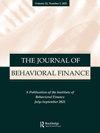运用谷歌趋势和深度学习预测金融市场动荡
IF 1.2
3区 经济学
Q3 BUSINESS, FINANCE
引用次数: 9
摘要
摘要本文采用文本挖掘方法对10000篇中央银行演讲构建金融词典,并在此基础上使用谷歌趋势指数来衡量人们对金融新闻的兴趣。特别是,我们利用深度学习技术研究了这些指数与金融市场动荡之间的关系,这些技术是针对各种机器学习算法和传统统计技术进行基准测试的。我们的主要发现是谷歌查询传达了能够在短时间内(一个月)预测未来市场动荡的信息,并且深度学习算法明显优于基准技术。谷歌趋势可以为建立危机预警系统提供有用的投入,因为与通常滞后数周或数月的官方财务指标相比,社会数据更具响应性。因此,这种不断更新当前社会数据的早期预警系统(EWS)可以成为政策制定者的宝贵工具,因为它可以立即识别危机是否迫在眉睫的迹象。本文章由计算机程序翻译,如有差异,请以英文原文为准。
Employing Google Trends and Deep Learning in Forecasting Financial Market Turbulence
Abstract In this paper we apply text mining methodologies on a set of 10,000 Central Bank speeches to construct a financial dictionary, based on which we use Google Trends indices to measure people’s interest in financial news. Particularly, we investigate the relationship between these indices and financial market turbulence leveraging on Deep Learning techniques, which are benchmarked against a variety of Machine Learning algorithms and traditional statistical techniques. Our main finding is that Google queries convey information able to predict future market turbulence in a short time period (one month), and that Deep Learning algorithms clearly outperform over benchmark techniques. Google Trends can provide useful input in the creation of crisis Early Warning Systems, as social data are more responsive compared to official financial indicators, which are usually available with a lag of several weeks or months. Thus, such an Early Warning System (EWS) that is continuously updated with current social data can be a valuable tool for policymakers, as it can immediately identify signs of whether a crisis is imminent or not.
求助全文
通过发布文献求助,成功后即可免费获取论文全文。
去求助
来源期刊

Journal of Behavioral Finance
Multiple-
CiteScore
4.60
自引率
10.50%
发文量
34
期刊介绍:
In Journal of Behavioral Finance , leaders in many fields are brought together to address the implications of current work on individual and group emotion, cognition, and action for the behavior of investment markets. They include specialists in personality, social, and clinical psychology; psychiatry; organizational behavior; accounting; marketing; sociology; anthropology; behavioral economics; finance; and the multidisciplinary study of judgment and decision making. The journal will foster debate among groups who have keen insights into the behavioral patterns of markets but have not historically published in the more traditional financial and economic journals. Further, it will stimulate new interdisciplinary research and theory that will build a body of knowledge about the psychological influences on investment market fluctuations. The most obvious benefit will be a new understanding of investment markets that can greatly improve investment decision making. Another benefit will be the opportunity for behavioral scientists to expand the scope of their studies via the use of the enormous databases that document behavior in investment markets.
 求助内容:
求助内容: 应助结果提醒方式:
应助结果提醒方式:


